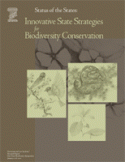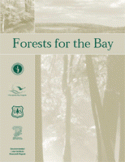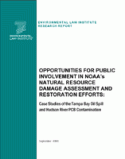
Research Reports
ELI publishes Research Reports available for free download that present the analysis and conclusions of the policy studies ELI undertakes to improve environmental law and policy. These reports contribute to education of the profession and disseminate diverse points of view and opinions to stimulate a robust and creative exchange of ideas. Those publications, which express opinions of the authors and not necessarily those of the Institute, its Board of Directors, or funding organizations, exemplify ELI’s commitment to dialogue with all sectors.
The United States now faces a biodiversity crisis of historic proportions. It is estimated that "one-third of the native U.S. flora and fauna is considered to be of conservation concern." States are currently facing unprecedented habitat loss, degradation, and fragmentation due to sprawl development, agriculture, and other land modifications. Many states are also being confronted with contentious Endangered Species Act battles. However, few, if any, federal laws or programs address protection of the broader array of plants, animals, and ecosystems before they become imperiled.
Read More >
This Workbook will help community leaders, local organizers, and citizens groups assess environmental health problems in their neighborhoods and assist them in tackling these problems. It outlines an approach to identifying problems, gathering information, and establishing the community`s priorities for improving the environmental health of its residents. Examples for Washington, D.C. serve as illustrations and possible examples. Residents of other cities and localities can find equivalent resources and data within their own communities.
Read More >
Forests are vital to the health of the Chesapeake Bay. Policy makers and the public are now recognizing the role the Bay's forests play in helping to maintain water quality, air quality, watershed health and resilience, living resources, economic productivity, and the region’s quality of life. The new Chesapeake Bay Agreement signed in June 2000 commits Maryland, Pennsylvania, Virginia, the District of Columbia, the Chesapeake Bay Commission, and federal agencies to take actions that will "promote the expansion and connection of contiguous forests" in the Bay watershed.

Following the 1999 study, ELI began work on the second phase of its research which focused on whether a collaboration between EPA and the public libraries could serve to increase capacity of communities to participate in EPA activities.
Read More >
This study examines two NRDA cases -- contamination of the Hudson River with polychlorinated biphenyls (PCBs) and the 1993 Tampa Bay oil spill -- and identifies public participation strategies that DAC may choose to implement for future NRDA efforts.
Read More >